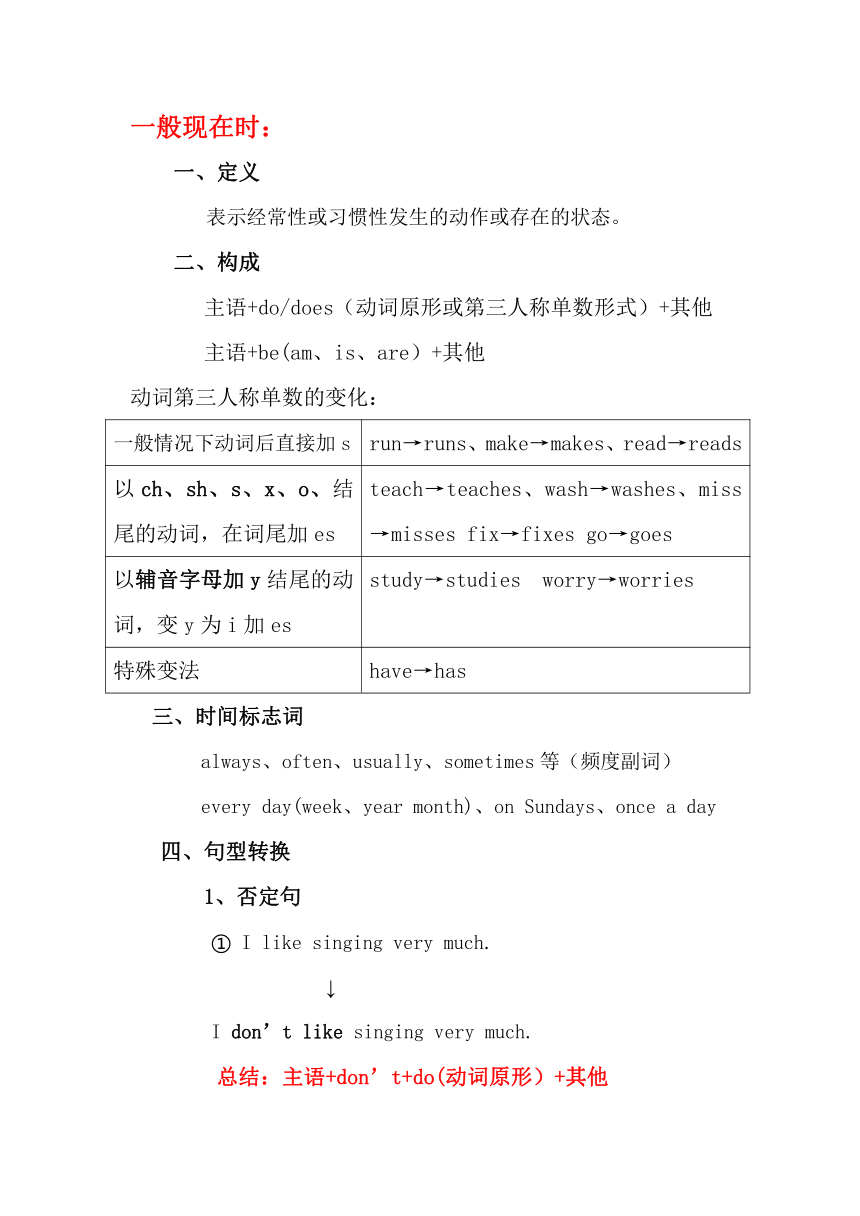牛津译林版中考一般现在时时态总结
图片预览

文档简介
一般现在时:
1、定义
表示经常性或习惯性发生的动作或存在的状态。
2、构成
主语+do/does(动词原形或第三人称单数形式)+其他
主语+be(am、is、are)+其他
动词第三人称单数的变化:
一般情况下动词后直接加s
run→runs、make→makes、read→reads
以ch、sh、s、x、o、结尾的动词,在词尾加es
teach→teaches、wash→washes、miss→misses
fix→fixes
go→goes
以辅音字母加y结尾的动词,变y为i加es
study→studies
worry→worries
特殊变法
have→has
三、时间标志词
always、often、usually、sometimes等(频度副词)
every
day(week、year
month)、on
Sundays、once
a
day
四、句型转换
1、否定句
①
I
like
singing
very
much.
↓
I
don’t
like
singing
very
much.
总结:主语+don’t+do(动词原形)+其他
②
My
sister
likes
TFboys
very
much.
↓
My
sister
doesn’t
like
TFboys
very
much.
总结:主语(三单)+doesn't+do(动词原形)+其他
③
TFboys
are
popular
in
China
.
↓
TFboys
are
not
popular
in
China
.
总结:主语+be(am、is、are)not+其他
2、一般疑问句
①
I
like
singing
very
much.
↓
Do
you
like
singing
very
much?
总结:Do+主语+do(动词原形)+其他?
回答:Yes,主语+do;
No,主语+don’t
②
My
sister
likes
TFboys
very
much.
↓
Does
your
sister
like
TFboys
very
much?
总结:Does+主语(三单)+do(动词原形)+其他?
回答:Yes,主语+does;
No,主语+doesn't
③
TFboys
are
popular
in
china
.
↓
Are
TFboys
popular
in
China?
总结:Be(am、is、are)+主语+其他?
回答:Yes,主语+be
;No,主语+be
not(缩写)
3、特殊疑问句
Wendy
often
teaches
English
online
on
Sundays.
对wendy提问:Who
often
teaches
English
online
on
Sundays?
对主语提问:特殊疑问词+do/does/be+其他?
对teaches
English提问:What
does
Wendy
often
do
online
on
Sundays?
对on
Sundays提问
:When
does
Wendy
often
teaches
English
online?
对非主语提问:特殊疑问词+do/does/be+主语+其他?
5、特殊考点
1、客观真理
The
sun
rises
in
the
east.
2、if引导条件状语从句
I
will
tell
him
the
news
if
he
comes
tomorrow。
1、定义
表示经常性或习惯性发生的动作或存在的状态。
2、构成
主语+do/does(动词原形或第三人称单数形式)+其他
主语+be(am、is、are)+其他
动词第三人称单数的变化:
一般情况下动词后直接加s
run→runs、make→makes、read→reads
以ch、sh、s、x、o、结尾的动词,在词尾加es
teach→teaches、wash→washes、miss→misses
fix→fixes
go→goes
以辅音字母加y结尾的动词,变y为i加es
study→studies
worry→worries
特殊变法
have→has
三、时间标志词
always、often、usually、sometimes等(频度副词)
every
day(week、year
month)、on
Sundays、once
a
day
四、句型转换
1、否定句
①
I
like
singing
very
much.
↓
I
don’t
like
singing
very
much.
总结:主语+don’t+do(动词原形)+其他
②
My
sister
likes
TFboys
very
much.
↓
My
sister
doesn’t
like
TFboys
very
much.
总结:主语(三单)+doesn't+do(动词原形)+其他
③
TFboys
are
popular
in
China
.
↓
TFboys
are
not
popular
in
China
.
总结:主语+be(am、is、are)not+其他
2、一般疑问句
①
I
like
singing
very
much.
↓
Do
you
like
singing
very
much?
总结:Do+主语+do(动词原形)+其他?
回答:Yes,主语+do;
No,主语+don’t
②
My
sister
likes
TFboys
very
much.
↓
Does
your
sister
like
TFboys
very
much?
总结:Does+主语(三单)+do(动词原形)+其他?
回答:Yes,主语+does;
No,主语+doesn't
③
TFboys
are
popular
in
china
.
↓
Are
TFboys
popular
in
China?
总结:Be(am、is、are)+主语+其他?
回答:Yes,主语+be
;No,主语+be
not(缩写)
3、特殊疑问句
Wendy
often
teaches
English
online
on
Sundays.
对wendy提问:Who
often
teaches
English
online
on
Sundays?
对主语提问:特殊疑问词+do/does/be+其他?
对teaches
English提问:What
does
Wendy
often
do
online
on
Sundays?
对on
Sundays提问
:When
does
Wendy
often
teaches
English
online?
对非主语提问:特殊疑问词+do/does/be+主语+其他?
5、特殊考点
1、客观真理
The
sun
rises
in
the
east.
2、if引导条件状语从句
I
will
tell
him
the
news
if
he
comes
tomorrow。
同课章节目录
- 词法
- 名词
- 动词和动词短语
- 动词语态
- 动词时态
- 助动词和情态动词
- 非谓语动词
- 冠词
- 代词
- 数词和量词
- 形容词副词及其比较等级
- 介词和介词短语
- 连词和感叹词
- 构词法
- 相似、相近词比较
- 句法
- 陈述句
- 一般疑问句和否定疑问句
- 特殊疑问句及选择疑问句
- 反意疑问句
- 存在句(There be句型)
- 宾语从句
- 定语从句
- 状语从句
- 主谓一致问题
- 简单句
- 并列句
- 复合句
- 主谓一致
- 主、表语从句
- 名词性从句
- 直接引语和间接引语
- 虚拟语气
- 感叹句
- 强调句
- 倒装句
- 祈使句
- 句子的成分
- 句子的分类
- 题型专区
- 单项选择部分
- 易错题
- 完形填空
- 阅读理解
- 词汇练习
- 听说训练
- 句型转换
- 补全对话
- 短文改错
- 翻译
- 书面表达
- 任务型阅读
- 语法填空
- 其他资料
